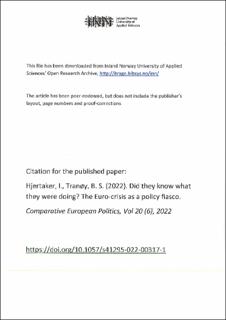Did they know what they were doing? The Euro-crisis as a policy fiasco
Peer reviewed, Journal article
Accepted version

View/
Date
2022Metadata
Show full item recordCollections
Original version
10.1057/s41295-022-00317-1Abstract
How should history judge the euro crisis and the way it was handled? Does it qualify as a policy fiasco in the sense that it was avoidable? Or could the crisis at least have been handled in a manner which substantially reduced its destructive impact on the economic and social welfare and politics of Europe? These questions demand counter-factual analysis. Nevertheless, they deserve attention. How history is interpreted impacts decisions about today and tomorrow. The article explores three discourses about economic governance: On financial stability, on fiscal policy and on growth. Each discourse came with pathologies: They did not sensitize decisionmakers to crucial negative consequences of the policy choices they privileged at decisive points in the sequence of boom, bust and (policy engineered) painfully slow recovery. The ECB has quietly changed its ways, but unwillingness to confront the crisis head on as a policy fiasco can obstruct learning opportunities that are important for the EU and the Eurozone going forward.